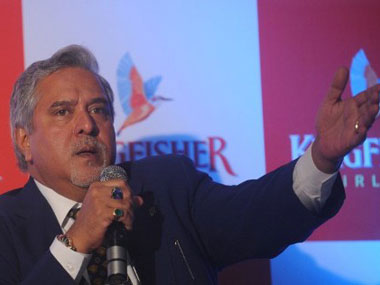For a man who lives by the brand message King of Good Times, the prospect of running from bank to bank begging for money even to meet working capital requirements - the equivalent of living from hand to mouth - must be intensely mortifying.
But Vijay Mallya shows no symptoms of contrition or shame. And for all his claims to not seeking a bailout, the very fact that no less than the Prime Minister has said that a way should be found to help the troubled Kingfisher Airlines and at least one Union Minister has been out batting to keep the company afloat suggests that the very visible hand of the state is manifestly at work to keep it on life support.
[caption id=“attachment_222997” align=“alignleft” width=“380” caption=“Mallya refuses to acknowledge that his investment has failed, and is sucking the life force out of him and his empire. Reuters”]  [/caption]
Although saner counsel appears to have subsequently prevailed, with public sector financial institutions disclaiming any immediate move to administer the kiss of life to the company, the levers of the “crony capitalist” system are geared precisely to work in the aid of one so well-connected as Mallya.
The rationale for any such attempts at forced resuscitation rests on very thin ground. Kingfisher Airlines isn’t just facing a liquidity issue: the company’s problems cannot be solved with the infusion of working capital to fund day-to-day operations. Although that might re-establish signs of life in the company, in the way that life support systems do even in terminally ill patients, this company is, as the Veritas Investment Research noted a few months ago, “a dead man walking.”
Or more appropriately, it’s a dead bird squawking.
Kingfisher Airlines is technically bankrupt, and in any sane credit market, its various exercises in subterfuge to repackage its non-performing loans would have raised a stink so high that the company would have been liquidated in a trice.
Impact Shorts
More ShortsTo be fair to Mallya, a sane credit market would also have had established bankruptcy protection provisions that would have helped the company seek shelter in time, and perhaps restructure its way out of crisis. It would have also provided the company’s creditors a reasonable chance to retrieve the bad money they’d thrown at it.
As it is now, they stand by to throw good money after bad: but that kiss of life might end up infecting them with the toxicity of Kingfisher’s books of accounts.
But then, the crony capitalist system is rather more comfortable with “backdoor bailouts” of the sorts that is being contemplated for Kingfisher, where the well-heeled milk the mammaries of the milch cows that come in the form of state-owned banks.
Mallya himself is increasingly beginning to sound like a man who has fallen hopelessly in love with an investment -and who refuses to acknowledge that it has failed, and is sucking the life force out of him and his empire.
All this is the more surprising because Mallya isn’t unused to failure, as the carcasses of businesses he’s left in his wake will testify. So, he ought to know there’s no shame in admitting to failure. Shame only comes from being reviled as someone whose company cooked its books, whose accounting standards are capricious, and who is living from hand to mouth to keep a dead dream alive.
Perhaps Mr Mallya saw the airline venture as a gamble. Perhaps it gave him an adrenaline rush. But as the Gambler’s Anthem holds, you’ve got to know when to hold ’em and when to fold ’em; Know when to walk away and when to run.
This, Mr Mallya, is a time to fold ’em and to run. This dead bird won’t fly.


)

)
)
)
)
)
)
)
)



